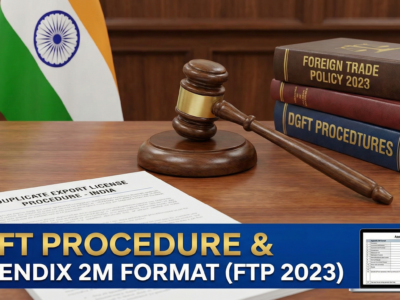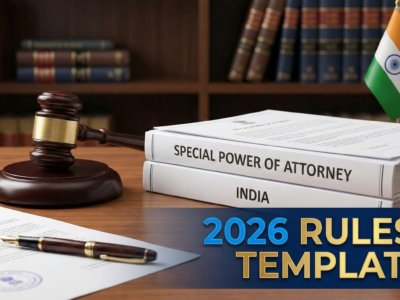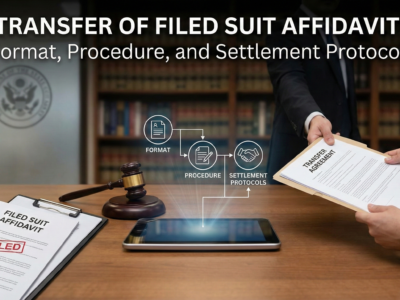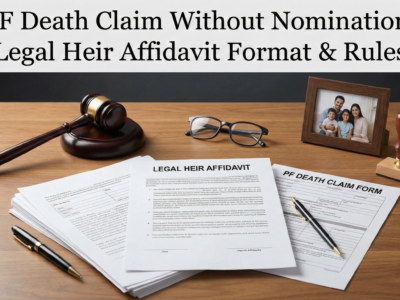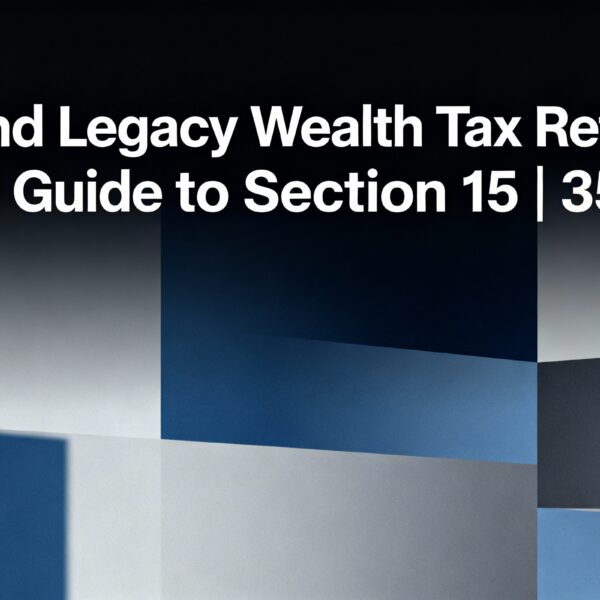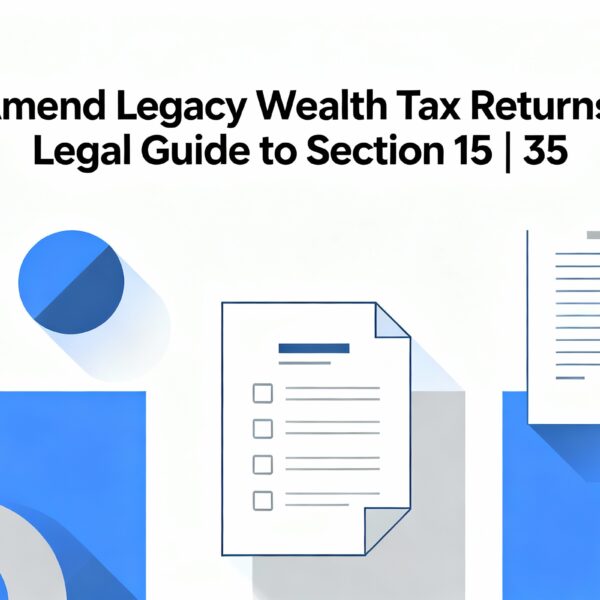Missed the deadline for your Income Tax or GST appeal? It’s a stressful situation, but Indian law offers a remedy. This guide provides a complete walkthrough of filing an Affidavit for Condonation of Delay under Section 5 of the Limitation Act, 1963. Learn what constitutes “sufficient cause,” understand key legal principles from landmark cases, and get actionable steps. We provide filterable draft templates for your application and affidavit (in English, Hindi, Bengali, Tamil, & Telugu) for common reasons like personal illness or a counsel’s mistake.
Evaakil.com
Your Guide to Indian Legal Drafts
A Practical Guide: Affidavits for Condonation of Delay in Indian Tax Appeals
Updated: October 2025
Filing an appeal late can be a stressful experience. The good news is that Indian law provides a safety net: the "condonation of delay." This guide explains the legal principle, shows you what counts as a valid reason, and provides filterable templates for your affidavit.
Legal systems need rules and deadlines to function. This is captured in the principle that the law helps the vigilant, not those who sleep on their rights. However, a strict application of deadlines can lead to unfair outcomes.
To balance fairness and finality, Section 5 of the Limitation Act, 1963, gives courts and tribunals the discretionary power to "condone" (i.e., forgive) a delay.
This power can be used if you (the appellant) can satisfy the court that you had a "sufficient cause" for not filing the appeal within the prescribed time.
The Supreme Court has clarified that "sufficient cause" should be interpreted liberally to advance "substantial justice." The goal is to decide cases on merit, not to dismiss them on technicalities.
This is the foundational case. The Supreme Court laid down the "liberal approach" doctrine, stating that:
The court clarified that "sufficient cause" should be given a meaning that advances justice. It noted that the length of the delay is not the only factor; the *reason* for the delay is more important. It also held that a *bona fide* mistake by a lawyer can be a "sufficient cause."
"Sufficient Cause" is not defined in the Act, giving judges flexibility. However, decades of case law show what is generally accepted and what is not. The court is checking for two things: good faith and a lack of negligence.
Based on an analysis of tribunal cases, the reasons for delay often fall into a few key categories. While every case is unique, this chart shows a typical distribution of *accepted* grounds.
An affidavit is a sworn statement of facts. It's not a letter; it's a formal piece of evidence. Every affidavit must contain these four key parts.
Identifies the Tribunal/Court (e.g., "Before the ITAT, Delhi Bench") and the case details (e.g., "In the matter of..."). States who you are (the "deponent"), your connection to the case (e.g., "Director of...", "Proprietor of..."), and confirms you know the facts. This is the heart of the affidavit. It's the story of the delay, told in logical order (e.g., "1. The order was received on... 2. The deadline was... 3. I fell ill on..."). The final paragraph where you swear under oath that the contents are true. This makes the document legally binding and holds you accountable for perjury.
Realizing you've missed a filing deadline is stressful. Here is a practical, step-by-step guide on what to do next.
Do not wait. The principle of condonation requires you to be diligent. Every *additional* day of delay after you realize your mistake must also be explained. "I was late, and then I waited two more weeks" is a very poor argument. Be precise. Note the date you received the order, the statutory last date for filing, and the date you are *actually* filing. The period between the last date and the actual filing date is the delay you need to explain. Your affidavit is weak without proof. Get your documents in order *now*.
You need two key documents:
File your main appeal (Memorandum of Appeal), the Application for Condonation, and the supporting Affidavit (with all annexures) as one complete set. Do not file the appeal first and the application later.
The affidavit (containing the facts) must be filed along with a formal application (the petition) that makes the legal request. This application is often a simple, one-page document.
This template is for the application itself. It must be supported by one of the affidavits from the next section.
This is the formal petition. It refers to the affidavit, which contains the actual reasons.
Use these affidavit templates as a starting point. You must adapt them to the exact facts of your case. Fill in all blanks and attach supporting evidence (like a medical certificate).
Note on Translations: The Hindi, Bengali, Tamil, and Telugu tabs provide illustrative translations of the template structure. They are for educational purposes only and are NOT a substitute for professional legal translation. Always consult a qualified professional for official legal documents in these languages.
Best for proprietors/individuals who were personally incapacitated. Best for companies where the delay was caused by a third party (e.g., advocate, consultant) or an external event.
The two templates show different, but effective, strategies. The key is to match your story to the facts and provide proof.
Be prepared. The tax department (the Respondent) will almost always object to your condonation application. Their job is to defend the original order. Here are their most common arguments:
This is their primary weapon. They will argue your reason (e.g., "I forgot," "I was busy") amounts to carelessness, which the law does not protect. If you claim illness but don't attach a medical certificate, they will immediately point it out. An affidavit without evidence is just a self-serving statement. If there is a long delay (e.g., 90 days), they will argue you must explain the *entire* period, not just one part of it. This is why your affidavit's timeline is so important. Claims like "I was out of station" or "my consultant was busy" will be attacked as vague. You must provide specifics: *where* were you, and *why* was the consultant busy?
The COVID-19 pandemic was an unprecedented event. The Supreme Court of India took *suo motu* (on its own) cognizance and passed orders that excluded the period from March 15, 2020, to February 28, 2022, from limitation periods.
For delays during this specific period, tribunals were extremely liberal. However, for delays *after* this period, you cannot just blame "COVID-19." You must be specific.
Instead of "delay due to COVID," your affidavit should state: "My office was closed under a local lockdown from [Date] to [Date]," or "My accountant was quarantined from [Date] to [Date], and all files were with him." Be specific and, if possible, attach the relevant government circular or medical report.
A: No, the law does not set a maximum limit. The key factor is the "sufficient cause," not the length of the delay. A short delay of 10 days with a weak, negligent reason may be rejected, while a long delay of 100+ days with a genuine, proven reason (like prolonged hospitalization) can be accepted.
A: Not necessarily. As established in cases like *N. Balakrishnan v. M. Krishnamurthy*, the courts often hold that a client should not suffer for a *bona fide* (good faith) mistake of their counsel. However, this does not apply to gross negligence. The best practice is to support your application with a separate, short affidavit from the lawyer admitting their specific error.
A: They are two different but related documents:
Before you sign, run through this final checklist.
Be Completely Honest. This is a sworn statement. Exaggerating or fabricating reasons is perjury, a criminal offense. Honesty is the first and most important rule. Tell a Clear, Chronological Story. Don't jump around. Start at the beginning (receiving the order) and walk the judge step-by-step through what happened. Provide Proof. An affidavit with evidence is 100x stronger. Attach the medical certificate, the doctor's note, or the advocate's affidavit. Annex and label everything clearly. Explain the *Entire* Delay. Don't just explain why you were late on the last day. If you were sick for 10 days, your affidavit should cover that entire 10-day period, showing why you couldn't file. Don't Blame the Court. Never blame the system or the department. Focus on your reasons and maintain a respectful tone.
What is "Condonation of Delay"?
Key Legal Principles from Landmark Cases
Collector, Land Acquisition, Anantnag v. Mst. Katiji (1987)
N. Balakrishnan v. M. Krishnamurthy (1998)
The "Sufficient Cause" Test: What Works vs. What Doesn't
Generally Accepted Reasons
Generally Rejected Reasons
Commonly Accepted Grounds (Data Snapshot)
Anatomy of a Condonation Affidavit
1. Cause Title & Jurisdiction
2. Deponent's Identification
3. Chronological Narration
4. Verification Clause
Step-by-Step: What to Do When You Miss a Deadline
Act Immediately
Calculate the Exact Delay
Gather Your Evidence
Draft Two Documents
1. The Application: A formal petition (e.g., "Application for Condonation of Delay u/s 5 of Limitation Act") that *requests* the tribunal to condone the delay.
2. The Affidavit: This is the sworn statement (like the templates below) that contains the *evidence and facts* supporting your application.
File Everything Together
Drafting the Condonation Application (The Petition)
Template: Condonation Application (General)
BEFORE THE [Appellate Authority, e.g., Income Tax Appellate Tribunal]
[City] BENCH, [City]
Appeal No. [Leave blank if new]
Assessment Year: [Year]
[Your/Company Name]
... Appellant
Vs.
[The Tax Department, e.g., The Deputy Commissioner of Income Tax]
... Respondent
APPLICATION FOR CONDONATION OF DELAY UNDER SECTION 5
OF THE LIMITATION ACT, 1963
The Appellant respectfully states as follows:
1. That the Appellant has filed the accompanying Memorandum of Appeal before this Hon'ble Tribunal against the order of [Authority, e.g., CIT(Appeals)] dated [Date of Order].
2. That the said appeal was due to be filed on or before [Last Date to File].
3. That the appeal is being filed today, on [Date of Actual Filing]. There is thus a delay of [Number] days in filing the appeal.
4. That the reasons for the said delay are fully explained in the affidavit of [Name of Deponent], which is attached hereto and forms part of this application.
5. That the delay in filing the appeal was on account of bona fide reasons and "sufficient cause" as explained in the affidavit, and not due to any negligence or willful default on the part of the Appellant.
6. That the Appellant has a strong case on merits and will suffer irreparable loss if the delay is not condoned and the appeal is not heard.
PRAYER
It is, therefore, most respectfully prayed that this Hon'Toole Tribunal may be pleased to:
a) Condone the delay of [Number] days in filing the appeal;
b) Admit the appeal to be heard on its merits;
c) Pass any such further orders as this Hon'ble Tribunal may deem fit.
For [Your/Company Name]
(Signature)
Appellant/Authorized Representative
Place: [City]
Date: [Date of Filing]
Filterable Affidavit Templates
Template 1: Affidavit for Delay Due to Personal Illness (Sales Tax / GST)
BEFORE [Appellate Authority, e.g., The Deputy Commissioner (Appeals), State GST]
AT [City]
In the matter of: [Your Firm Name]
For the Assessment Year [Year] / Period [Period]
AFFIDAVIT
I, [Your Full Name], aged about [Age] years, son of [Father's Name], resident of [Your Address], do hereby solemnly affirm and state as follows:
1. That I am the proprietor of the above-named firm, [Firm Name], and am fully conversant with the facts of this case.
2. That I received the Assessment Order dated [Date of Order] on [Date of Receipt].
3. That the statutory period for filing an appeal against the said order expired on [Last Date to File].
4. That unfortunately, I fell ill with [Name of Illness] on or about [Date of Illness Start] and was under the continuous medical care of [Doctor's Name].
5. That my doctor advised complete bed rest, and I was unable to attend to any business matters until [Date of Recovery]. (A medical certificate from Dr. [Doctor's Name] is annexed hereto as **Annexure-A**).
6. That immediately upon recovering, I contacted my consultant and filed the appeal on [Date of Actual Filing].
7. That the delay of [Number] days in filing the appeal was solely due to my medical condition, which was beyond my control, and not due to any negligence on my part.
8. That this affidavit is filed in support of the application for condonation of delay.
That it is, therefore, prayed that this Hon'ble Authority may be pleased to condone the delay of [Number] days and admit the appeal to be heard on its merits.
DEPONENT
VERIFICATION
I, [Your Full Name], the deponent above, do hereby verify that the contents of paragraphs 1 to 8 of this affidavit are true to my personal knowledge and belief. Nothing material has been concealed.
Verified at [City] on this [Day] day of [Month], [Year].
DEPONENT
Template 2: Affidavit for Delay Due to Counsel/External Event (Income Tax)
BEFORE THE INCOME TAX APPELLATE TRIBUNAL
[City] BENCH, [City]
In the matter of: [Company Name Pvt. Ltd.]
Assessment Year: [Year]
AFFIDAVIT
I, [Your Full Name], aged about [Age] years, son of [Father's Name], serving as the [Your Designation, e.g., Director] of [Company Name Pvt. Ltd.], having its registered office at [Company Address], do hereby solemnly affirm and state as follows:
1. That I am the [Designation] of the appellant company and am duly authorized and competent to swear this affidavit. I am well-conversant with the facts of this case.
2. That the order of the Ld. Commissioner of Income-tax (Appeals) dated [Date of CIT(A) Order] was received by the company on [Date of Receipt].
3. That the time for filing the appeal before this Hon'ble Tribunal expired on [Last Date to File].
4. That the company had instructed its advocate, Mr./Ms. [Advocate's Name], to file the Memorandum of Appeal on [Date, e.g., the last day].
5. That on the said date, the advocate [Explain the reason clearly, e.g., "was unable to reach the Tribunal office in time due to a sudden and major traffic blockage caused by a public procession for [Event Name]" OR "suffered a medical emergency" OR "inadvertently misplaced the file due to an ongoing office relocation"].
(If the advocate made a mistake, it is best to attach a separate, brief affidavit from the advocate admitting the *bona fide* error.)
6. That the appeal was consequently filed on the very next working day, [Date of Actual Filing], resulting in a delay of [Number] day(s).
7. That the delay in filing the appeal was not intentional or due to any negligence on the part of the appellant company, but was entirely due to the aforementioned unforeseen circumstances.
That it is, therefore, prayed that this Hon'ble Tribunal may be pleased to condone the delay and admit the appeal for hearing.
DEPONENT
VERIFICATION
I, [Your Full Name], the deponent above, do hereby verify that the contents of paragraphs 1 to 7 of this affidavit are true to my personal knowledge and information received. Nothing material has been concealed.
Verified at [City] on this [Day] day of [Month], [Year].
DEPONENT
Template Strategy: A Side-by-Side Comparison
Component
Template 1 (Personal Illness)
Template 2 (External Event)
Reason for Delay
Personal to the appellant (illness).
External to the appellant (advocate/event).
Burden of Proof
On the appellant to prove they were incapacitated.
On the appellant to show they were diligent, but their agent failed.
Supporting Evidence
Excellent. Explicitly mentions annexing a medical certificate.
Good. Implied (details are verifiable). Would be stronger with an advocate's affidavit.
Legal Citation
Implicitly supports the main application (which cites the law).
Implicitly supports the main application.
Common Objections by the Tax Department
1. "Gross Negligence, Not Sufficient Cause"
2. "No Supporting Evidence"
3. "Delay Not Explained Day-by-Day"
4. "Reason is Vague and an Afterthought"
A Note on COVID-19 & Other 'Force Majeure' Events
Frequently Asked Questions (FAQ)
Q: Is there a maximum number of days that can be condoned?
Q: My lawyer made a mistake and missed the deadline. Will my case be rejected?
Q: What is the difference between the "Application" and the "Affidavit"?
• The Application is the formal petition. It's a short document that simply *requests* the tribunal to condone the delay, citing Section 5 of the Limitation Act. (See the template provided above).
• The Affidavit is the *evidence* that supports your application. It is your sworn statement of facts, presented in a chronological list, explaining *why* the delay happened. The affidavit is the most important part.
Final Checklist: Best Practices for Drafting



